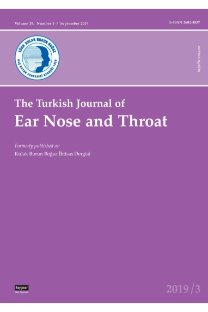Oğuz BASUT, Hamdi Hakan COŞKUN, Levent ERİŞEN, İlker TEZEL, Selçuk ONART, İbrahim HIZALAN, Tuncel ÖZDİLEK
Tinnituslu hastalarda hiperinsülinemi sıklığı ve diyabet diyetinin tinnitus üzerine etkisi
Amaç: Tinnitus yakınması ile baflvuran hastalardahiperinsülinemi sıklığı arafltırıldı ve uygulanan diyabet diyetinin tinnitus üzerine etkisi değerlendirildi.Hastalar ve Yöntemler: İdyopatik tinnitusu olan 52hastada 26 erkek, 26 kadın; ort. yafl 50; dağılım 2080 serum insülin düzeyi ve oral glikoz toleransı ölçüldü ve dört ay süreyle uygulanan diyabet diyetsonrasında tinnitus yakınmalarındaki değiflikliklerbelirlendi. Hastalara tedavi öncesinde ve sonrasındatinnitus anketi uygulandı ve flikayetleri sınıflandırıldı.İnsülin düzeyi ve oral glikoz toleransı değerleri, yaflve cinsiyet uyumlu 15 gönüllüden oluflan kontrol grubu değerleriyle karflılafltırıldı.Bulgular: Tinnitusu bulunan hastalarda %76 oranındahiperinsülinemi saptandı; bu oran kontrol grubunda%27 idi p
Anahtar Kelimeler:
Kan glikozu, diabetes mellitus, insüline bağımlı olmayan/komplikasyon, diyabet diyeti, glikoztolerans testi, hiperinsülinemi/tanı/komplikasyon, tinnitus/etyoloji/tanı/tedavi, vertigo/etyoloji
The incidence of hyperinsulinemia in patients with tinnitus and the effect of a diabetic diet on tinnitus
Objectives: We investigated the incidence of hyper insulinemia in patients presenting with tinnitus and evaluated the effect of diabetic diet on tinnitus.Patients and Methods: Serum insülin levels were measured and oral glucose tolerance test was performed in 52 patients 26 males, 26 females; mean age 50 years; range 20 to 80 years with idiopathic tinnitus. Those with hyperinsulinemia were given a diabetic diet for four months. A questionnaire was administered to ali the patients and the complaint of tinnitus was assessed according to a rating scale before and after treatment.The results were compared with those of 15 age-and sex-matched Controls.Results: Hyperinsulinemia was detected in 76% and 27% of the patients and the Controls, respectively p<0.05 . Oral glucose tolerance test was normal in 48% of the patients, and in 80% of the Con trols p<0.05 . Following a diabetic diet, the severity of tinnitus complaints significantly decreased in patients with hyperinsulinemia p<0.0001 .Conclusion: Hyperinsulinemia may play an etiologic role in tinnitus and a diabetic diet may result in significant improvement in tinnitus complaints in this population.
Keywords:
Blood glucose, diabetes mellitus, non-insulin dependent/complications, diabetic diet, glucose tolerance test, hyperinsulinemia/diagnosis/complications, tinnitus/etiology/ diagnosis/therapy, vertigo/etiology,
___
- Summers RL, Montani JP, Woodward LH, Coleman TG, Hall JE. Theoretical analysis of the mechanisms of chronic hyperinsulinemia. Comput Biol Med 1997;27: 249-56.
- Kraft JR. Hyperinsulinemia: The common denomina- tor of subjective idiopathic tinnitus and other idio- pathic central and peripheral neurootologic disorders. Int Tinnitus J 1995;1:46-53.
- Gananca MM, Caovilla HH, Gananca FF, Serafini F. Dietary management for tinnitus control in patients with hyperinsulinemia-a re t rospective study. Int Tinnitus J 1995;1:41-5.
- Werner JF, Richter B, Laubert A. Some remarks on the classification of subjective idiopathic tinnitus (SIT) - an essay toward establishing a cross-matched grading system. Int Tinnitus J 1995;1:38-40.
- Sismanis A, Butts FM, Hughes GB. Objective tinnitus in benign intracranial hypertension: an update. Laryngoscope 1990;100:33-6.
- Külahlı İ, Cüreoğlu S, Cemiloğlu R, Yiğitbaflı OG. Tin- nitus: 217 hastanın değerlendirilmesi. Türk ORL Arfli- vi 1993;31:196-9.
- Aydın H, Ada M, Kaytaz A. Diabetik hastalarda ABR bulguları. Türk ORL Arflivi 1995;33:52-6.
- Mangabeira Albernaz PL, Fukuda Y. Glucose, insulin and inner ear pathology. Acta Otolaryngol 1984;97:496-501.
- Zimmet PZ. Hyperinsulinemia-how innocent a bystander? Diabetes Care 1993;16 Suppl 3:56-70.
- Z a v a roni I, Bonora E, Pagliara M, Dall’Aglio E, Luchetti L, Buonanno G, et al. Risk factors for coronary artery dis- ease in healthy persons with hyperinsulinemia and nor- mal glucose tolerance. N Engl J Med 1989;320:702-6.
- ISSN: 2602-4837
- Yayın Aralığı: Yılda 4 Sayı
- Başlangıç: 1991
- Yayıncı: İstanbul Üniversitesi
Sayıdaki Diğer Makaleler
Erken evreli glottik kanserlerde cerrahi tedavi seçimi ve onkolojik sonuçlar
M. Kezban GÜRBÜZ, Erkan ÖZÜDOĞRU, Hamdi ÇAKLI, Emre CİNGİ, Cem KEÇİK, Cemal CİNGİ
Atopi veya alerjili olgularda alerjen-spesifik IgE düzeyleri
Murat Cem MİMAN, Orhan ÖZTURAN, Tamer ERDEM, İbrahim H. ÖZEROL
Tinnituslu hastalarda hiperinsülinemi sıklığı ve diyabet diyetinin tinnitus üzerine etkisi
Oğuz BASUT, Hamdi Hakan COŞKUN, Levent ERİŞEN, İlker TEZEL, Selçuk ONART, İbrahim HIZALAN, Tuncel ÖZDİLEK
